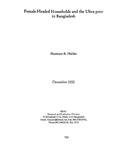Female-headed households and the ultra poor in Bangladesh
Date
2000-12Publisher
Research and Evaluation Division, BracAuthor
Halder, Shantana R.Metadata
Show full item recordCitation
Halder, S. R. (2000). Female-headed households and the ultra poor in Bangladesh. Research Reports (2000), Economic Studies, (XVI), 169–188.Abstract
This report focuses on the magnitude of FHHs among the poorest and examines their
socio-economic profile to highlight the distinction between FHHs and the entire
sample. Female-headed households (FHHs) are of two types: households without any
male adult where female is solely responsible for the well-being of the household and
households where a female is the decision maker and receives monetary support from
other male members who have migrated out for employment. The first one is defined
as de facto and secone one as de jure households. The prevalence of FHHs among the
ultra poor is calculated at 35%, of them 78% were de facto households. The de facto
households were smaller in size, nearly SO% of them were comprised of one member
households, 98% were single parent households, three-fourth of them were
educationally dark, one-forth of them did not possess any living houses. One-third of
the de facto household heads were either beggars or disabled. The de facto households
were economically less well off. Major sources of their income were charity and wage
employment. A lower percentage of the de facto households owned any kind of nonland
assets, the value of which was also significantly lower than others. On the other
hand, the de jure households were relatively more well-off compared to de facto
households and on some indicator better-off than others.

